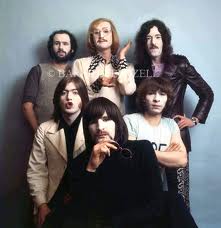Back to the Future

May 5, 2014
Last week's discussion at Biola with Peter Leithart and Fred Sanders left me with much to reflect upon, not least the cognitive dissonance between Peter Escalante's now legendary mustache (which appeared at first glance to indicate sympathies with the Bonzo Dog Band) and his (indeed our shared) love for The Kinks.
reflect upon, not least the cognitive dissonance between Peter Escalante's now legendary mustache (which appeared at first glance to indicate sympathies with the Bonzo Dog Band) and his (indeed our shared) love for The Kinks.
Nevertheless, moving from sixties rock to the less serious matter of the future of Protestantism, my one big regret is that we never managed to address the issue I raised in my very first point. Here's what I have in my written text:
This is, of course, not a direct criticism of either Peter or Fred. But it is to say that there are questions both of priorities and of theology here. In discussing the future of Protestantism, I am convinced that we need to prioritise the pastoral and the local.
Yet this is not to raise a complaint about sophisticated theology, to say that the job of the church is to dumb down everything to the lowest level. On the contrary, it is to underscore its absolutely vital nature. It is sophisticated theological confession which shapes and drives local pedagogy and gives individual churches their identities and their resources. The ten point doctrinal statement simply is not going to hold any Protestant church together in the coming cultural storm. Mere Christianity is good for building parachurch alliances and good for evangelistic purposes; but it is of little or no use in answering the harder ethical and social questions being aggressively hurled at us by the outside world.
In short, we need an exile theology, a theology which gives us historical identity, theological resources and future hope. I believe that classic confessional Reformed Presbyterianism provides precisely such. That is a point I will be exploring in a forthcoming feature article in First Things magazine.
resources and future hope. I believe that classic confessional Reformed Presbyterianism provides precisely such. That is a point I will be exploring in a forthcoming feature article in First Things magazine.
(In a day or so I will offer more specific reflections on what we did discuss over at First Thoughts.)
 reflect upon, not least the cognitive dissonance between Peter Escalante's now legendary mustache (which appeared at first glance to indicate sympathies with the Bonzo Dog Band) and his (indeed our shared) love for The Kinks.
reflect upon, not least the cognitive dissonance between Peter Escalante's now legendary mustache (which appeared at first glance to indicate sympathies with the Bonzo Dog Band) and his (indeed our shared) love for The Kinks.Nevertheless, moving from sixties rock to the less serious matter of the future of Protestantism, my one big regret is that we never managed to address the issue I raised in my very first point. Here's what I have in my written text:
It seems to me that the issue of the future of Protestantism can only be addressed in the context of discussing the future of American Christianity as a whole. Clearly that is too large a matter for a ten minute introductory statement but one thing is for certain: Christianity, at least in its traditional, orthodox forms, is about to see itself politically and socially marginalized in America in a way unprecedented in history. Central to this is the way in which same sex marriage has come to function both culturally and legally. Recent judicial rulings and the appropriation of the idioms of the Civil Rights movement have effectively shut down intelligent discussion on the issue in the public square. This will change everything for Christians. It is one thing to be regarded as intellectually foolish for believing in the resurrection of the dead; it is quite another to be regarded as morally dangerous for believing that marriage is to be between one man and one woman. Societies generally tolerate idiots, allowing them to go about their daily business unhindered. Peddlers of hate typically have a harder time. Conservative American Christians must realize not simply that they are no longer kingmakers in election years; they might soon not even be regarded as legitimate members of society in many quarters. And the speed at which this is happening is such that there is little or no time for the church to prepare her people for this.This is surely the key immediate problem facing the church. And it does so at the most basic levels. So often ecumenism and ecumenical discussions are elite activities between theologians and church leaders. As such, these activities have little connection to everyday church life or, to be even more concise, everyday life. It is also worth remembering that church leaders will probably not have to face the ethical issues in quite the same raw and immediate way that the Christian layperson on the shop floor or at the check out will. Thus, it behooves the church first and foremost to fulfill her pastoral and pedagogical duty to such church members by giving them the theology, the identity, and the local community which will be necessary for being faithful not in the conference room of some swanky hotel but in the aisles of the local supermarket or the classroom of the local high school.
This is perhaps where I have sympathy with Peter's concerns. In this new world, American evangelicalism, existing as it does as a somewhat nebulous network of institutions and organisations, is ill equipped to cope. Its various sects fight each other constantly, often it seems simply for the right to define, restrict, or to monopolise the use of the very name 'evangelical.' Its doctrinal content tends towards the minimal, in large part because of its need to maintain its size and marketplace by parachurch alliances. And in its various manifestations in America, it seems often to end up being focused on cults of personality and increasingly unrealistic expectations of cultural influence. Along with Peter, I believe that such a movement, if one can even use the term in the singular, cannot provide the historical rootedness or sophistication of theological confession necessary to sustain the communal identity and foster the intellectual resources needed to survive in an increasingly aggressive anti-Christian environment.
This is, of course, not a direct criticism of either Peter or Fred. But it is to say that there are questions both of priorities and of theology here. In discussing the future of Protestantism, I am convinced that we need to prioritise the pastoral and the local.
Yet this is not to raise a complaint about sophisticated theology, to say that the job of the church is to dumb down everything to the lowest level. On the contrary, it is to underscore its absolutely vital nature. It is sophisticated theological confession which shapes and drives local pedagogy and gives individual churches their identities and their resources. The ten point doctrinal statement simply is not going to hold any Protestant church together in the coming cultural storm. Mere Christianity is good for building parachurch alliances and good for evangelistic purposes; but it is of little or no use in answering the harder ethical and social questions being aggressively hurled at us by the outside world.
In short, we need an exile theology, a theology which gives us historical identity, theological
 resources and future hope. I believe that classic confessional Reformed Presbyterianism provides precisely such. That is a point I will be exploring in a forthcoming feature article in First Things magazine.
resources and future hope. I believe that classic confessional Reformed Presbyterianism provides precisely such. That is a point I will be exploring in a forthcoming feature article in First Things magazine.(In a day or so I will offer more specific reflections on what we did discuss over at First Thoughts.)




